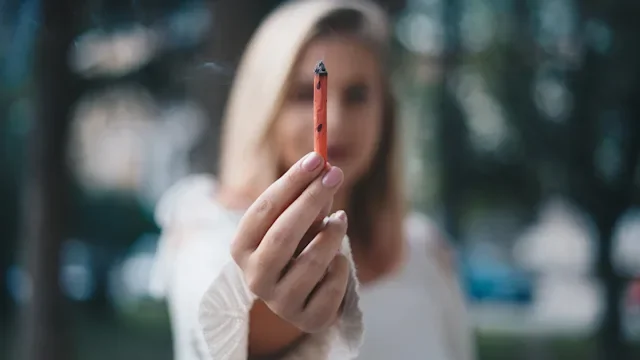Key takeaways
Teens who use marijuana are more likely to experience depression, and suicidal ideation may be a symptom of depression.
There is no evidence to suggest that cannabis use causes depression and suicidal ideation, but using cannabis may be a form of self-medication for teens dealing with mental health issues.
Teen suicide can be prevented. If you or someone you know is struggling with suicidal thoughts, seek help right away.
Cannabis, or marijuana, use is common among teenagers. A 2019 national survey found that 1.8 million (7.4%) teens ages 12 to 17 reported using cannabis within the past month. Using cannabis at a young age can be harmful. Cannabis use can have long-lasting effects on a teen’s developing brain, and it’s linked to mental health issues, including depression, anxiety, and suicide.
Teen mental health and cannabis use
Marijuana refers to products made from the cannabis sativa plant. It contains tetrahydrocannabinol, or THC, which is a chemical that causes you to feel pleasurable effects like relaxation and euphoria. Cannabis is becoming increasingly available, as many states have begun to legalize its use. Though there are restrictions based on age, teens are still finding ways to get their hands on cannabis, whether it is from legal sources, improperly secured cannabis at home, or the black market.
Teen cannabis use is cause for concern because it is linked to mental health problems, such as:
Schizophrenia
Suicide
Search and compare options
In some cases, teens with mental health issues may turn to cannabis to cope with their negative feelings. This is called self-medication. The teen may assume that cannabis will help alleviate their symptoms. While it may work in the short-term, it typically causes more long-term problems, including problems with learning, thinking, and memory. Teens who are using cannabis would benefit from treatment to help prevent these long-term issues.
Some people who use cannabis may experience a brief episode of psychosis. This can involve extreme paranoia, hallucinations (seeing or hearing things that are not real), and a loss of touch with reality. Research has shown that there is some kind of link between psychosis and cannabis use. In general, the risks appear the greatest the earlier a person starts using cannabis, the heavier they use it, and the more THC they consume.
Marijuana and depression in teens
Teens with depression are nearly twice as likely to use marijuana as non-depressed teens. While using cannabis may temporarily offer pleasure, relaxation, and euphoria, over time cannabis use can actually worsen depression. Some studies have even found that using cannabis during the teen years is linked to later depression in adulthood. Researchers believe that this is because the teenage brain is developing and substances like cannabis may alter development in important areas like the frontal cortex and limbic system.
Suicidal ideation and marijuana use in teens
Teens who use cannabis are more likely to have depression. One symptom of severe depression is suicidal ideation, which refers to having thoughts about taking one’s own life. There is also a link between teens using cannabis and experiencing severe depression and suicidal ideation. In fact, teens who use cannabis are 3 times more likely to experience suicidal ideation than teens who don’t use it. These teens are also at greater risk of attempting suicide.
Suicidal ideation can be scary for anyone experiencing it and their loved ones. Warning signs of suicide include:
Extreme shifts in mood
Feelings of sadness, depression, and hopelessness
Increased risk-taking
Withdrawing from friends and family
Changes in eating or sleeping patterns
Giving away important items
Talking about death
Researching suicide or death
Using drugs or alcohol
Read more like this
Explore these related articles, suggested for readers like you.
If you think that you or someone you know is at risk for suicide, call 911 or the National Suicide Prevention Lifeline at 1-800-273-8255.
Teen suicide statistics
A significant number of teens suffer from mental health issues in the United States. A 2019 survey found that 3.8 million (around 16%) American teens ages 12 to 17 reported experiencing a major depressive episode in the past year. Females and Hispanic teens were more likely to experience depression than other groups.
Suicide is a serious public health issue and is the second leading cause of death among teens between the ages of 15 and 19 years old. Each year, 1 out of every 15 high schoolers attempts suicide, and 1 out of every 53 high schoolers has an attempt that is severe enough to warrant medical attention.
Teen suicide rates have increased over the past decade. The number of people ages 10 to 24 who attempted suicide increased by about 57% between 2007 and 2018. Groups of teens at highest risk of suicide include:
Members of the LGBTQ+ community
Military service members
Teens involved in the child welfare or criminal justice systems
No one suffering from depression and suicidal ideation should become a statistic. If you or someone you know is struggling, seek help right away.
Does teen cannabis use increase odds of suicide later in life?
Teens who use cannabis are at higher risk of depression and suicidal ideation as they grow older. Researchers also believe that cannabis has negative effects on the developing teenage brain. For the first 21 years of life, the developing brain is more vulnerable to the negative effects of THC. Because of the risks of suicide and mental health problems as teens grow older, professionals recommend that teens stay away from cannabis.
Teen suicide prevention
If you are a teen struggling with depression or suicidal thoughts, you are not alone. It can be difficult to cope with these thoughts and feelings, especially if you are also using cannabis at the same time. If you are experiencing depression and having a hard time controlling your cannabis use, you may be dealing with a co-occurring disorder. Treatment may include medications and therapy, including group and individual therapy.
If you are under 18 years old, you may need your parent or guardian to consent to treatment for you. However, laws and age restrictions vary from state to state. You can start the process by speaking with your parent(s) or caretakers about your concerns and your desire to get help. If you are not comfortable speaking with them, you may also consider talking to another trusted adult, like your pediatrician, teacher, or coach.
If you are a teen experiencing suicidal thoughts or a mental health crisis, then you should take action right away by contacting one of the following:
Call 911.
Call the National Suicide Prevention Lifeline at 1-800-273-8255. The lifeline is open 24/7 and all calls are free and confidential.
Text the Crisis Text Line at 741741 (U.S. and Canada). The text line is also available 24/7 and free of charge.
Parents and caregivers play an important role in teen suicide prevention. If you are concerned that your teen is at risk for suicide or has a history of suicidal thoughts or attempts, consider the following suggestions:
Encourage your child to open up to you about how they are feeling. Try to approach conversations in a non-judgmental way. If your teen is reluctant to talk to you, ask them whether they might be more comfortable talking to another family member, teacher, therapist, or healthcare provider.
Talk to your teen about the benefits of getting professional help. This may involve seeing a psychiatrist or psychiatric nurse practitioner for medication or speaking with a therapist. You can start the treatment process by talking to your child’s pediatrician, contacting your health insurance company, or going to SAMHSA’s Behavioral Health Treatment Services Locator.
Remove anything that can be potentially lethal from the teen’s home or environment. This includes weapons, medications, and sharp objects.
Get help. Contact 911 or the National Suicide Prevention Lifeline right away if you have any concerns about your teen’s safety.
Whether you are a teen experiencing suicidal thoughts or a parent, do not hesitate to reach out for support.
The bottom line
Teens who use cannabis show higher rates of suffering from mental health issues like depression and suicidal ideation. While there is a link between teens using cannabis and experiencing depression and suicidal ideation, there is not enough information to assume that cannabis causes these mental health conditions. For some teens, cannabis may be a way of self-medicating to cope with negative feelings, while others may develop depression after using cannabis. Either way, teen suicide is preventable. If you are a teen or parent who has concerns, do not hesitate to reach out for help.
If you or someone you know is having thoughts of suicide, you’re not alone and help is available. Call the National Suicide Prevention Lifeline at 1-800-273-8255 or text HOME to 741741 to reach the Crisis Text Line.
If you or someone you know struggles with substance use, help is available. Call SAMHSA’s National Helpline at 1-800-662-HELP (4357) to learn about resources in your area.

Why trust our experts?


References
Centers for Disease Control and Prevention. (2022). Adolescent health.
Crisis Text Line. (n.d.). In a crisis?.
Curtin, S. C. (2020). State suidice rates among adolescents and young adults aged 10-24: United States, 200-2018. National Vital Statistics Reports.
Gobbi, G., et al. (2019). Association of cannabis use in adolescence and risk of depression, anxiety, and suicidality in young adulthood. The Journal of the American Medical Association.
Jacobus, J., et al. (2014). Effects of cannabis on the adolescent brain. Current Pharmaceutical Design.
National Center for Complementary and Integrative Health. (2019). Cannabis (marijuana) and cannabinoids: What you need to know.
National District Attorneys Association. (2013). Minor consent to medical treatment laws.
National Institute on Drug Abuse. (n.d.). Want to know more? Some FAQs about marijuana.
National Institute on Drug Abuse. (2019). Cannabis (marijuana).
National Institute of Mental Health. (n.d.). Warning signs of suicide.
National Institute of Mental Health. (2018). Comorbidity: Substance use disorder and other mental illnesses.
Schmidt, K., et al. (2020). A systemic review: Adolecent cannabis use and suicide. Addictive Disorders & Their Treatment.
Substance Abuse and Mental Health Services Administration. (n.d.). Behavioral health treatment services locator.
Substance Abuse and Mental Health Services Administration. (2020). Behavioral health barometer.
Substance Abuse and Mental Health Services Administration. (2022). SAMHSA’s national helpline.
U. S. Department of Justice. (2008). Marijuana use worsens depression: An analysis of recent data shows ‘self-medicating’ could actually make things worse.
Youth.gov. (n.d.). Suicide prevention.

















